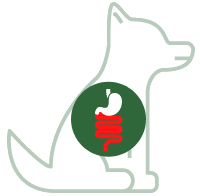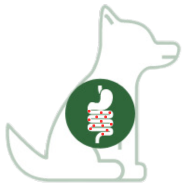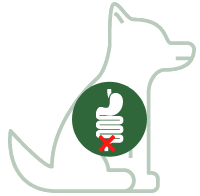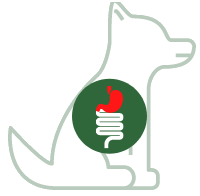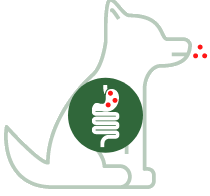Stomach and intestinal problems in dogs
The digestive system of dogs ensures that sufficient nutrients and moisture are absorbed from the food to provide your dog with enough energy. The intestinal peristalsis (movements of the intestine) and the gut flora (the good bacteria in your dog's intestine) are sensitive to changes; different food, as well as stress, can cause your dog's intestines to move differently than usual. This can lead to stomach and intestinal problems.
Symptoms of Stomach and Intestinal Problems in Dogs
Some dogs show more than others that they are suffering from their stomach or intestines. Symptoms that may indicate stomach and intestinal problems in your dog include:
- Nausea (smacking, drooling, burping, being lethargic, wanting to eat less).
- Vomiting.
- Flatulence.
- Constipation: difficulty or inability to defecate, straining without effect, very hard stools.
- Diarrhea.
- Clearly audible intestinal sounds.
- Weight loss.
- Poor condition.
- General malaise.
- Reduced appetite.
- Drinking more or less than usual.
- Different smell or color of stool.
- Blood or mucus in the stool.
- Having to defecate more often or feeling more urgency than normal.
- Eating a lot of grass.
- Restlessness.
- Prayer posture: when in abdominal pain, dogs often lie down with their forehand on the ground while their hindquarters remain standing.
Eating Grass: Is it Good or Not?
Research shows that most dogs eat grass regularly. They usually seem to do this because they find it fun or tasty. If your dog suddenly starts doing this more often, it is often said that this happens because he has stomach problems and 'wants to vomit'. Whether this is really true is hard to say with certainty. The fact is that eating a lot of grass is not very good, especially if your dog has a sensitive stomach. Grass cannot be digested and is therefore excreted. This can cause difficulty defecating because the long strands partly remain in the rectum. Grass is often somewhat sharp and this can irritate the stomach wall, thus causing more stomach problems. Finally, if grass is vomited up, a strand can sometimes 'shoot' the wrong way and stick behind the palate of your dog, which is very annoying for your dog!
Eating grass is not very serious, but should definitely not be encouraged, and if your dog has stomach or intestinal problems, it is better to prevent eating grass as much as possible.
How Does My Dog Get Diarrhea?
Diarrhea in dogs can occur when a dog eats or drinks something wrong, for example, something from the street or trash, feces, but also wrong food or contaminated water. Also, worms, parasites such as Giardia, or certain medications (such as antibiotics) can cause diarrhea in dogs.
The Difference Between Acute and Chronic Diarrhea
Acute diarrhea is often caused by a disruption in the intestines by bacteria, a virus, or a parasite. Acute diarrhea usually goes away on its own. If the diarrhea lasts more than three weeks or recurs regularly, it is considered chronic diarrhea. Chronic diarrhea can indicate a digestive problem, an underlying disease, or a food allergy, for example. The vet will investigate step by step why your dog has intestinal problems in case of chronic diarrhea.
What Helps My Dog with Stomach and Intestinal Problems and Diarrhea?
If your dog has mild stomach or intestinal problems, you can do a lot to support him:
- Iso-Gel: a water-binding fiber that can help thicken the stool as well as make defecating smoother if your dog has difficulty defecating.
- Probiotics: with diarrhea, there is often a disturbance in the gut flora. A probiotic adds good bacteria and provides them with the right nutrients. Also very suitable to give at the end of an antibiotic course.
- Puur Stomac: to maintain a healthy stomach and intestinal function, for example, if your dog eats a lot of grass or suffers from a rumbling stomach or intestines.
- Sanimed Intestinal: a special easily digestible diet food to support stomach and intestinal problems.
- Deworming: especially if your dog comes into contact with other dogs a lot or sniffs around outside and occasionally eats something from the street or bushes, deworming is a first step. To help prevent intestinal problems, it's wise to deworm him regularly, about four times a year.
When to Visit the Vet for Stomach and Intestinal Problems?
If your dog is otherwise fit and cheerful, eats well and does not vomit, you can often wait a few days with mild intestinal problems like diarrhea. You can adjust your dog's diet or give dietary supplements that help thicken the stool.
However, if your dog is seriously ill, vomiting a lot, and has severe diarrhea, he can become dehydrated quickly. This can lead to serious health problems. Always contact your vet in such cases. Also, if your dog has chronic diarrhea, it is advisable to let your vet investigate further.
When to Visit the Vet for Stomach and Intestinal Problems?
If your dog is otherwise fit and cheerful, eating well, and not vomiting, you can often wait and see with mild intestinal problems like diarrhea. You can adjust your dog's diet or give supplements that help thicken the stool.
However, if your dog is seriously ill, vomiting a lot, and has severe diarrhea, he can become dehydrated quickly. This can lead to serious health problems. Always contact your veterinarian in such cases. Also, if your dog suffers from chronic diarrhea, it is advisable to have your veterinarian investigate this further.
If your dog has the following symptoms, contact your veterinarian immediately:
- Fever (>39.5 degrees).
- Very lethargic or listless.
- Not wanting to eat and/or drink.
- Persistent vomiting (more than once or twice).
- Blood in the stool.
- Black stool.
- Blood in vomit or vomit that looks like coffee grounds or feces.
- Pale gums.
- A bloated abdomen.
- Dry heaving: trying to vomit but nothing comes out.
- Diarrhea that lasts longer than three to five days.
- Straining without producing stool.
Young puppies and older dogs or dogs with underlying conditions weaken much faster, so don't wait too long to visit a veterinarian if your puppy or older dog is suffering from stomach or intestinal problems.
Stomach and intestinal problems are common in dogs. With good nutrition and supportive supplements from Pharmacy4pets, you can optimally support your dog's stomach and intestines. If you have a question about our products or about stomach and intestinal problems in your dog, please contact us.

